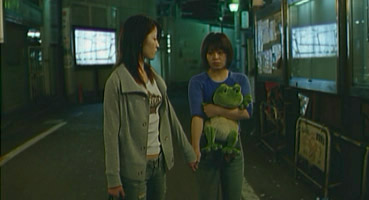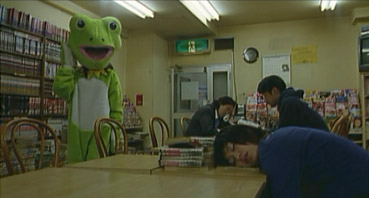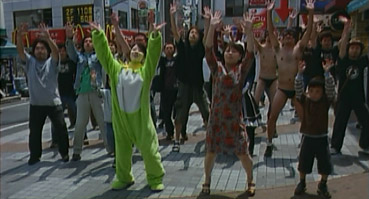|
A shopper casually browsing the shelves of their local video
store who encountered the DVD of Frog Song would be forgiven for instantly classifying it as a surrealistic
oddity. The title offers precious little clues to the content,
the box blurb describes the film as "truly bizarre,"
and the cover picture shows a young woman walking hand-in-hand
down a city street with an adult-sized humanoid frog, suggesting
an amphibian love story twist on Spike Jonze's memorable
music video for Daft Punk's Da Funk. All of which
is thoroughly misleading and gives no indication of the
considerable qualities of what is actually a tender and
involving drama on the frailty of friendship.
Frog
Song is a literal translation of the Japanese re-release
title Kaeru no uta, and was originally released
as Enjo-kôsai monogatari: shitagaru onna-tachi,
which translates roughly as Friendship Support Story:
Women Who Want to Do. Not very poetic, but it does
give a clearer indication of the theme. Frog Song
is an example of modern pink cinema, and if this term is
new to you then you can find a brief summary in our review
of Mitsuru Meike's Bitter
Sweet. Like most works of this uniquely Japanese
sub-genre, Frog Song runs for just over
an hour and has the requisite number of evenly spaced sex
scenes. In common with many of the better genre works, they
are logically and effectively integrated into the surrounding
drama and allowed to run only slightly longer than the story
needs them to, while their eroticism arises from their air of realism rather than the music accompanied softcore silliness
of traditional western adult dramas.

The
links with the aforementioned Bitter Sweet extend beyond the casting of lead actress Konatsu. The narratives
of both films are fuelled by an increasing non-permanence
in Japanese relationships, with a more empowered female
population no longer willing to silently tolerate male infidelity.
This stance is graphically illustrated in the opening scene
when the young Akemi (Konatsu) angrily hits her boyfriend
over the head with a bottle and, muttering a quick apology,
walks out on him. She takes refuge in a manga café,
but when fellow customer Kyoko (Rinako Hirasawa) picks up
the book she had planned to read, she becomes disproportionately
upset, tearfully harassing the girl until the book is reluctantly
returned.
This
fraught encounter actually unites the mismatched pair with
an economy typical of modern Japanese cinema, established
in a single edit and conversational references to discussions
that we have not been witness to. Their friendship develops
in sometimes surprising ways. In another nicely executed
time-jump edit, we find an almost naked Kyoko on bed a receiving
the sexual attentions of an older salaryman while the clothed
Akemi uncertainly watches on. Only in the scene
that follows do we realise that Kyoto is working as a part-time prostitute
and that Akemi agreed to participate in an arranged threesome,
probably more out of curiosity rather than any desire to actually
be involved. The sexual experiences of the two women are
clearly very different, as are their relationships with
men – for the friendless and live-alone Kyoko, sex is just business,
while for Akemi it's part of a relationship that she can't
seem to completely break free from, despite catching her
boyfriend in bed with another woman the day after their
break-up (in a memorably oddball moment, the two women later
end up beating each other with French loaves).
A particularly intriguing aspect of Frog Song is that although it adheres to genre conventions regarding
the quantity and narrative spacing of the sex scenes,
sex itself is shown as having a largely negative effect
on the lives of both women. Its purely functional role for
Kyoko may or may not be responsible for her state of relative
isolation and later proves destructive to her health in
general, while the abuse she suffers at the hands of two
S&M aficionados is a favourite movie way of suggesting
that the time has come to get out of this business. Akemi,
meanwhile, doesn't get to sit on the sidelines for long
and is pressed by Kyoko into taking on a customer of her
own, a task she performs with enough struggling reluctance
to prompt her friend to rethink the wisdom of her decision.
Later, she attempts to follow through on a stalled dream
by agreeing to take a beating from a customer instead of
sex, a sequence that in a single punch strips this particular
form of S&M of even a hint of perverse glamour.

It's
the unpredictable and sometimes troubled development of
the friendship between the two women that provides the film
with its emotional heart. It hits an engaging peak when the
pair sing and dance like excited schoolgirls to the Frog
Song of the title, but increasingly finds itself on troubled
ground. Akemi is repeatedly pestered by her ex-boyfriend
to come home – something Kyoko takes a selfish step to prevent –
and finds temporary sexual fulfillment by imagining herself
in the sort of relationship she has never known. Akemi's
frog fascination, meanwhile, which presumably is the source of the above mentioned cover quote about the film being bizarre, is actually no different to that of any
young girl with a liking for a particular animal in fluffy
toy form, while the life sized frog suit she buys gives rise
to the film's most surreal but touchingly affecting sequence,
when it is worn by Kyoko as an apology to her friend. Their
eventual parting has real emotional sting – too late comes
the realisation of their depth of feeling for each other
and the relationship that might have been.
The
few-years-on coda – introduced in the best time-jump edit
in the film – initially seems unnecessary, but follows through
on the feminist leanings of earlier scenes to show us two sisters
who really are doing it for themselves (hence the original
Japanese title). It ends on an everybody-join-in musical
dance number that, despite smashing a hole in the film's
carefully constructed reality, has a stumbling, hastily
choreographed exuberance that just filled me with joy. It's
a sequence typical of a film that defies pigeonholing as erotic drama
and which very effectively demonstrates just why pink cinema demands
its status as a genre in its own right. Frog Song
is an involving, moving tale of friendship and independence
in a changing society and a fine example of why these films are so worthy of attention.
Framed
1.85:1, the picture is letterboxed rather than anamorphically
enhanced, with the English subtitles positioned outside of the picture
area. This makes zooming in on widescreen TVs a non-starter
unless your Japanese is fluent. Mine isn't, but is good
enough to spot a couple of alterations to the Japanese
original,
but for the most part they are fine. But why weren't the
lyrics to the Frog Song translated? Anyway, the picture
itself, within the confines on non-enhancement, is rather
good, with solid contrast, generally sound black levels
and a decent level of detail, although this does vary a
little in later scenes. Some compression artefacts are evident
in darker scenes, but are not seriously distracting.

The
soundtrack is Dolby 2.0 mono, but well mixed and very clear.
Silence is well used here, and is pleasingly free of even
a hint of hiss. The gentle but sparingly employed acoustic
guitar score comes across well.
Stills
7 frame grabs from the film. Nothing the pause button couldn't
give you.
Pink
Cinema Introduction
A useful textual introduction to the genre for newcomers.
Short
Film: Japanese Box (11:27)
The same short film you'll find on the Bitter
Sweet DVD with the same stills gallery.
Blood & Dishonour Book Teaser
A 5-screen gallery promo for the book in question.
Trailers
Trailers for 99 Women, Black Mass
and Venus in Furs.
Not
a disc to hunt out for its extra features, this is one that
stands on the strength of the film itself, and that's good
enough for me. Oh, and just for the the fun of it, here's
a (very) rough translation of those Frog Song lyrics:
Even
if I stick to someone's chest
I still have guts
I can't see the sky
I can't see beyond
Jump and tummy out
I'm the daughter of a frog
|